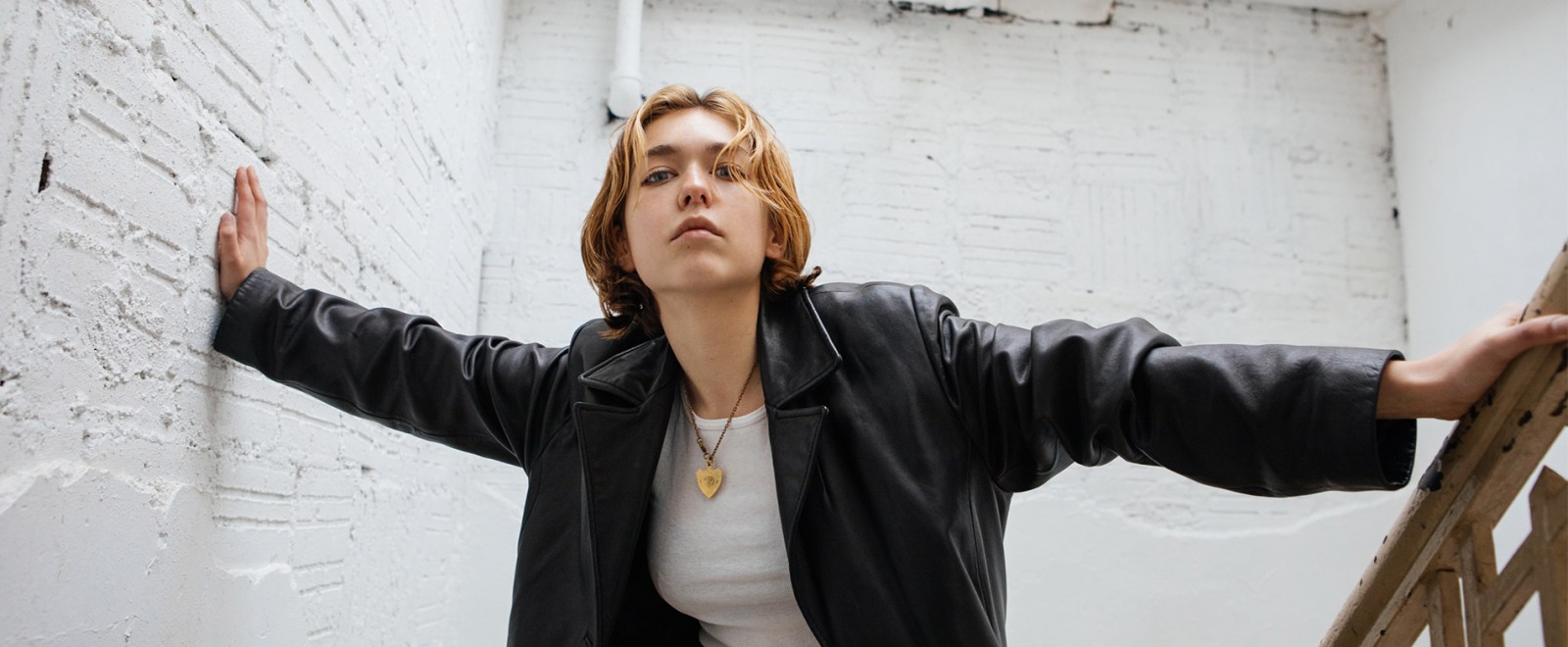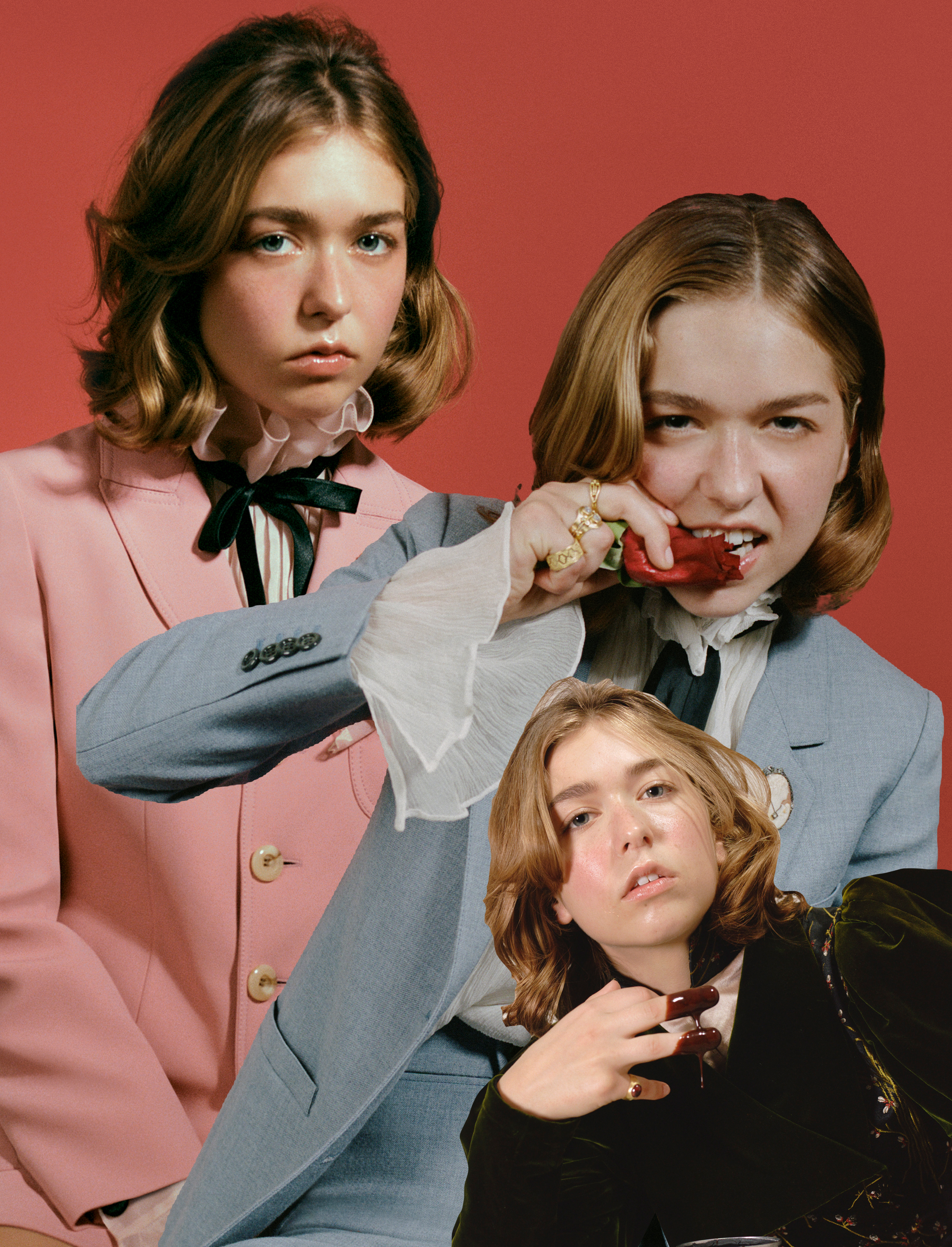
“I can’t pretend to be humble about it,” Lindsey Jordan, more commonly known as Snail Mail, tells me about her new record Valentine, out Nov. 5 via Matador. She’s wearing a white tank top, a golden locket around her neck, and silver slacks with intricate prints. She doesn’t look like she should be humble; she looks like the embodiment of the real deal.
The 22-year-old was not prepared for the success and fame that her debut full-length Lush ushered along, which is something she’s disclosed many times in interviews. It’s not exactly surprising; she was only 17 when she wrote the record, and the project of Snail Mail started off by playing basement shows. A few years after receiving praise from Pitchfork, NPR, and pretty much every other prestigious music outlet, she appears to be readily accepting the royal status.
“I feel like I’m really growing as a musician and a songwriter, and it’s hard to look backward at all,” she says. “Any expectations that are held that have to do with my teenage self are just super unfair because I’m a thousand percent different person. It’s uncomfortable because I feel like I have to kind of ease everyone into the adult version of my music and myself.”
Valentine pushes us into Jordan’s maturity, instantly portraying distance from the completely separate world of Lush. The songs on the first record are known for their visceral honesty, but it’s anchored by a kind of timidness; this new album is elevated with a newfound sense of strength and confidence. The opening song alone reaches a louder, more unabashed climax than any of Lush does, and the rest of the album oscillates between those roaring highs and intimate lows.

Her fashion choices communicate this with sophistication and a refined nature. Her suits give off an aura that explicitly demonstrates growth from Lush; Lush is someone who wants to see the world, and the aesthetics of Valentine are that of someone who has seen the world.
“My stylist Alexa [Lanza] and I worked for months together on figuring out how everything was gonna be,” she explains. “I think it’s really important to be careful when you start working with a stylist that you don’t start looking dumb. Bringing fashion into things is a slippery slope. You want to look cool, but not look like you’re wearing a rockstar costume. A big thing about being a part of the process was getting everything so that it’s like a high-stylized version of how I actually feel inside. I think it’s important to not let the clothes wear you. I have a very distinct style and a distinct eye for what I like and what I don’t like. It’s made the shopping process extremely difficult, but I also am really happy with everything that I wear. It’s like a sweet spot of glam and preppy and kind of androgynous.”
The shirt on the cover art of the third single “Madonna” is from the 1800s. The black, puffy garment makes Jordan stand out like a sore thumb against the white background. “It was crazy,” she says with a laugh. “It made me feel gross wearing it. I was like, ‘How would this have been washed if it’s well-preserved?’ And they were skinny as fuck back then. I was [sucking in my stomach] the whole time because there was a jacket inside the jacket and all this stuff. It’s an interesting thing to mess with, especially when you’re messing with the gender of it because they weren’t doing that back then.”
There’s almost a sense of sacrilege in this, but that’s a common theme of Valentine. The singer plays with divinity as if it’s an everyday topic for her, whether it be by calling herself the devil in “Ben Franklin” or summoning Jesus on “Glory.” The songs were primarily written during the pandemic, when she stayed productive and inspired by exercising and cooking. The process of being a newly-successful musician was strange considering there was really only one avenue through which she could do her job: relentlessly working on Valentine.

“Writing a record is a scary thing because, unless you work with songwriters, it’s really you, yourself, and you, just trying to keep your career afloat,” she says. It was the only expectation of her, and it intensified as Lush’s release in 2018 grew more distant. “I was just taking it one day at a time trying to do what feels right. Sometimes that’s writing. Sometimes it’s not,” she says. “It only feels real to me to make songs about things that I feel strongly about, but it doesn’t always translate to music I want to put out. Sometimes I cut songs because they’re too personal. Sometimes I change verses because they’re too personal. Sometimes I think something is just the perfect amount of personal. Sometimes I think something is a little too personal but I put it out anyway.”
The few years in between Lush and Valentine felt long to impatient fans, but it was especially long for Jordan. “[Lush] is so full of wonder and curiosity and pure excitement about life,” she says. “It’s super weird to return as a kind of cynical adult.” Her adulthood is mirrored in her new style as well: “I still hear so many things about what I was doing before, even as far as going into styling for shoots. It’s hard to be like, ‘Yeah, I wore a dress two years ago, but that doesn’t necessarily mean that’s who I am now.’ It feels uncomfortable for me to even think about it because it’s just a self that I’ve shed. I don’t want to look at my 19-, 18-, 17-, 16-year-old self.”
Things are always changing; she says that things are already even different from when she worked on Valentine. “But I still feel the pain of the songs. It was such an intense process and all of the songs do really mean significant things to me. I think with Lush and Habit, I was writing from the experiences that I had, but a lot of those feelings went away really quickly because they were about crushes and the pressures of growing up and stuff like that. And that just doesn’t cut as deep later as some of the stuff that I’m singing about now. It’s really twisted and turned my life; it really made me the person that I am.”

Valentine is not only a departure from teenage years, but also a goodbye to being regarded as only an indie-rock figure. “Madonna” and “Ben Franklin” are jangly, mischievous pop tracks with R&B undertones; throughout the whole album, there are synth-laden moments, detours into folk, and many places where genre is eluded altogether. “I think I started to get to a point where the guitar-heavy stuff appeases everybody. I was like, ‘If I’m making a guitar record, I’m doing it for someone else,’” she explains. “I didn’t want to make another ‘Damn this chick rocks’ album. I’m so sick of being the chick that rocks. I just want to make something that feels entirely like I’m not doing any kind of people-pleasing here.”
She also learned what to prioritize this time around, taking more creative control with Valentine than she did with Lush. “Last time I was so overwhelmed that I didn’t take any interest in the producing or music videos or any of the stuff that would have taken me out of how busy I already was,” she says. “But something I learned about myself is that it’s more important for me to put the effort in when it’s hard because later it’s a lot more rewarding.” The result is Valentine being not just music, but a carefully-constructed world that’s cohesive and layered with intent. There’s no reason for Jordan to be humble; Valentine feels like the beginning of a Snail Mail empire.
